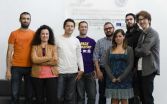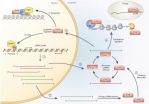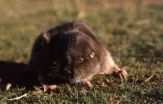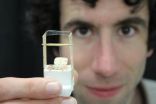(Press-News.org) Researchers at the University of Granada have designed new software that provides real time data on traffic. It is a device that provides information on traffic flow between cities. Drivers can use this information to choose the fastest route as they plan to drive to their destinations.
It is a highly reliable, low-cost method, easy and quick to install, which uses bluetooth devices. These devices collect real-time data on road traffic which it then sends to a central server. This information is then processed using complex data mining algorithms, evolutionary computing and neuronal networks, with the aim of providing users with information and predictions on the density and flow of traffic on any given route.
Current systems in use for the collection of data and the generation of information on the state of road traffic lack the capacity to identify the vehicles they detect and they are also costly, which makes them too expensive for use in secondary roads. This restricts their use to main roads that connect large urban centres.
The SIPEsCa project (Spanish for Low Cost Autonomous Information and Prediction System for Real Time Data on the State of Roads using Distributed Devices) has been developed by the GeNeura University of Granada research group and the company Ciudad 2020, with funds provided by the Andalusia 2007-2013 FEDER programme and with the support of personnel and researchers from the Public Works Agency at the Junta de Andalucia (the Andalusian regional government).
Data collection
According to the PI of this project, Pedro A. Castillo, from the Computer Architecture and Technology Department at the ETSIIT of the University of Granada, this new system is being tested in the metropolitan areas of Granada and Seville. Twenty monitorization nodes have been installed in these areas for data collection.
The data gathered through these devices generate a variety of statistics on vehicle use in their respective areas. "Thanks to this new method we have been able to monitor traffic density and movement on an individual basis, as vehicle users move between nodes within the zone in question".
These devices capture the signals broadcast by the different technological components inside each vehicle, such as GPS or hands-free devices, as well as drivers' mobile phones. As far as data privacy is concerned, the research team emphasises that the data they collect 'are never associated with any specific user, since they do not gather any information that can allow for the personal identification of the user from which they are collected'. To protect privacy they use encrypting technologies that do not allow for the identification of the MAC of the wireless device, which minimizes the intrusivity within the data gathering process.
According to Prof. Castillo, this information system developed at the University of Granada "facilitates real time information on the state of traffic, not only for institutions and authorities in charge of traffic regulation and control, but also for individual users—though mobile phone alerts or web-based devices".
INFORMATION:
New inexpensive and easy computer software provides real-time and highly accurate data on traffic
Researchers at the University of Granada and the company 'Ciudad 2020' are actually testing this new method in the metropolitan areas of Granada and Seville
2014-07-18
ELSE PRESS RELEASES FROM THIS DATE:
Consuming probiotics for a month helps diminish fat accumulation in the liver, new study says
2014-07-18
Spanish scientists have demonstrated through an experiment on obese rats that the consumption of probiotics during thirty days helps diminish the accumulation of fat in the liver. This new finding, published today by the journal PLOS ONE, is a great step forward on the fight agains the Non-Alcolohic Fatty Liver Disease (NAFLD), which is closely related to obesity and diabetes.
Researchers from the 'Nutrition Biochemistry: Theurapetic Applications' group (CTS-461) and the José Mataix Institute for Nutrition and Food Technology at the University of Granada have demonstrated ...
No evidence that California cellphone ban decreased accidents, says Colorado University Boulder researcher
2014-07-18
In a recent study, a researcher at the University of Colorado Boulder found no evidence that a California ban on using hand-held cellphones while driving decreased the number of traffic accidents in the state in the first six months following the ban.
The findings, published in the journal Transportation Research Part A: Policy and Practice, are surprising given prior research that suggests driving while using a cellphone is risky. For example, past laboratory studies have shown that people who talk on a cellphone while using driving simulators are as impaired as people ...
The differentially expressed genes in DRG that influence neural regeneration after SNI
2014-07-18
Slit-Robo GTPase-activating protein 3 contains a Rho GAP domain that regulates the activities of Rho family GTPases and affects actin polymerization, which influences dendrite elaboration, neurite outgrowth and axon guidance, contributing to neural regeneration. Anjie Lu, the Third Xiangya Hospital of Central South University, China and his team performed a microRNA microarray analysis and identified 23 microRNAs whose expression were significantly changed in rat dorsal root ganglia (DRG) after sciatic nerve injury (SNI). Bioinformatic analysis was used to determine microRNA-214 ...
The human δ2 glutamate receptor gene is not mutated in spinocerebellar ataxia patients
2014-07-18
Recent studies have demonstrated that glutamate receptor δ2 gene (GRID2) is closely related to cerebellar functions in mice. This gene is predominantly located in postsynaptic dendrites of parallel fiber–Purkinje cell synapses in the cerebellum and contains potential fragile sites within large introns. These fragile sites easily develop spontaneous mutation, which leads to Purkinje cell death, contributing to the manifestation of spinocerebellar ataxia in mice. The human GRID2 shares 90% homology with the orthologous mouse gene, and therefore it has become an important ...
PIWI proteins and piRNAs regulate genes in the germline and beyond
2014-07-18
Non-coding RNAs represent one of the most exciting aspects of current biomedical research. Non-coding RNAs include long non-coding RNAs (lncRNAs) which are generally longer than 200 nucleotides (nt) and small non-coding RNAs (sncRNAs) that are mostly 20-35 nt. Among sncRNAs, microRNAs (miRNAs) and small interfering RNAs (siRNAs) are commonly 21 nt in length, and both specifically bind to the AGO subfamily of the ARGONAUTE (AGO)/PIWI family proteins. PIWI-interacting RNAs (piRNAs), which are defined by their specific binding to the PIWI subfamily of AGO/PIWI family proteins, ...
'Support' cells in brain play important role in Down syndrome
2014-07-18
(SACRAMENTO, Calif.) – Researchers from UC Davis School of Medicine and Shriners Hospitals for Children – Northern California have identified a group of cells in the brain that they say plays an important role in the abnormal neuron development in Down syndrome. After developing a new model for studying the syndrome using patient-derived stem cells, the scientists also found that applying an inexpensive antibiotic to the cells appears to correct many abnormalities in the interaction between the cells and developing neurons.
The findings, which focused on support cells ...
Four new species of tuco-tucos identified from Bolivia
2014-07-18
Lincoln, Neb., July 18, 2014 -- A research team led by Scott Gardner of the University of Nebraska-Lincoln has identified four new species of Ctenomys, a genus of gopher-like mammal found throughout much of South America.
Commonly called tuco-tucos, the burrowing rodents range from 7 to 12 inches long and weigh less than a pound. They demonstrate the broad range of biological diversity in the lowlands and central valleys of Bolivia, where all four new species were found, Gardner said.
It is very rare to identify a new species of mammal, said Gardner, director of the H.W. ...
New material puts a twist in light
2014-07-18
Scientists at The Australian National University (ANU) have uncovered the secret to twisting light at will. It is the latest step in the development of photonics, the faster, more compact and less carbon-hungry successor to electronics.
A random find in the washing basket led the team to create the latest in a new breed of materials known as metamaterials. These artificial materials show extraordinary properties quite unlike natural materials.
"Our material can put a twist into light – that is, rotate its polarisation – orders of magnitude more strongly than natural materials," ...
In alcohol abusers, fish oil may reduce risk of neurodegeneration and ensuing dementia
2014-07-18
MAYWOOD, Ill-- Omega-3 fish oil might help protect against alcohol-related neurodamage and the risk of eventual dementia, according to a study published in the journal PLOS ONE.
Many human studies have shown that long-term alcohol abuse causes brain damage and increases the risk of dementia. The new study found that in brain cells exposed to high levels of alcohol, a fish oil compound protected against inflammation and neuronal cell death.
The study was conducted by Michael A. Collins, PhD, Edward J. Neafsey, PhD, and colleagues at Loyola University Chicago Stritch ...
Weight management program also reduces depression among black women
2014-07-18
DURHAM, N.C. -- An intervention program aimed at helping obese women maintain their weight without adding pounds also significantly reduced depression in nearly half the participants, according to a new study from Duke University.
The study was conducted with 185 low-income black women ages 25-44, each with a body mass index (BMI) of 25 to 35, who were receiving primary care at five community health centers in central North Carolina.
The program used software built by Duke researchers that personalized a weight-gain prevention intervention called the Shape Program for ...
LAST 30 PRESS RELEASES:
Tiny bubbles, big breakthrough: Cracking cancer’s “fortress”
A biological material that becomes stronger when wet could replace plastics
Glacial feast: Seals caught closer to glaciers had fuller stomachs
Get the picture? High-tech, low-cost lens focuses on global consumer markets
Antimicrobial resistance in foodborne bacteria remains a public health concern in Europe
Safer batteries for storing energy at massive scale
How can you rescue a “kidnapped” robot? A new AI system helps the robot regain its sense of location in dynamic, ever-changing environments
Brainwaves of mothers and children synchronize when playing together – even in an acquired language
A holiday to better recovery
Cal Poly’s fifth Climate Solutions Now conference to take place Feb. 23-27
Mask-wearing during COVID-19 linked to reduced air pollution–triggered heart attack risk in Japan
Achieving cross-coupling reactions of fatty amide reduction radicals via iridium-photorelay catalysis and other strategies
Shorter may be sweeter: Study finds 15-second health ads can curb junk food cravings
Family relationships identified in Stone Age graves on Gotland
Effectiveness of exercise to ease osteoarthritis symptoms likely minimal and transient
Cost of copper must rise double to meet basic copper needs
A gel for wounds that won’t heal
Iron, carbon, and the art of toxic cleanup
Organic soil amendments work together to help sandy soils hold water longer, study finds
Hidden carbon in mangrove soils may play a larger role in climate regulation than previously thought
Weight-loss wonder pills prompt scrutiny of key ingredient
Nonprofit leader Diane Dodge to receive 2026 Penn Nursing Renfield Foundation Award for Global Women’s Health
Maternal smoking during pregnancy may be linked to higher blood pressure in children, NIH study finds
New Lund model aims to shorten the path to life-saving cell and gene therapies
Researchers create ultra-stretchable, liquid-repellent materials via laser ablation
Combining AI with OCT shows potential for detecting lipid-rich plaques in coronary arteries
SeaCast revolutionizes Mediterranean Sea forecasting with AI-powered speed and accuracy
JMIR Publications’ JMIR Bioinformatics and Biotechnology invites submissions on Bridging Data, AI, and Innovation to Transform Health
Honey bees navigate more precisely than previously thought
Air pollution may directly contribute to Alzheimer’s disease
[Press-News.org] New inexpensive and easy computer software provides real-time and highly accurate data on trafficResearchers at the University of Granada and the company 'Ciudad 2020' are actually testing this new method in the metropolitan areas of Granada and Seville




